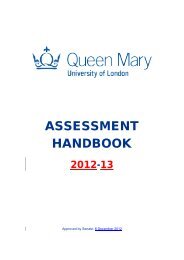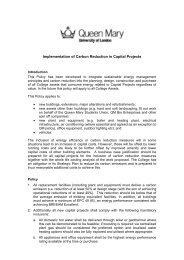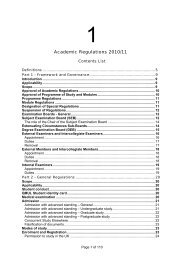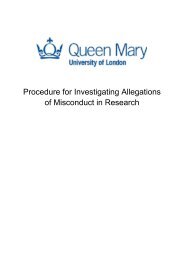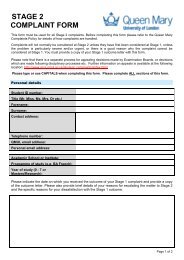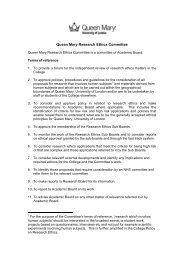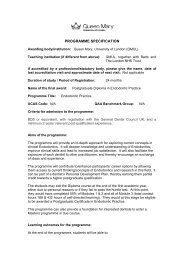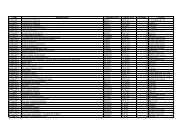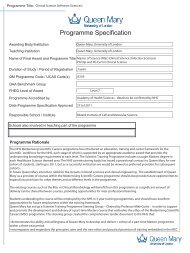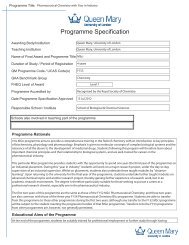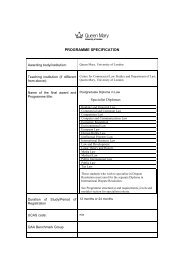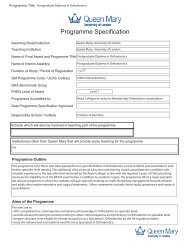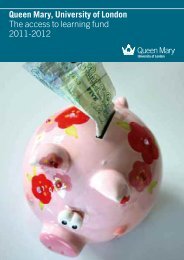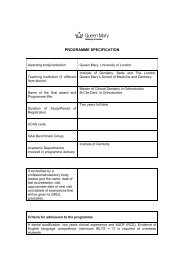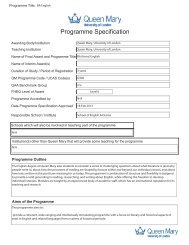GG41 - Queen Mary University of London
GG41 - Queen Mary University of London
GG41 - Queen Mary University of London
Create successful ePaper yourself
Turn your PDF publications into a flip-book with our unique Google optimized e-Paper software.
Programme Title: BSc Computer Science & Mathematics<br />
Programme Specification<br />
Awarding Body/Institution<br />
Teaching Institution<br />
<strong>Queen</strong> <strong>Mary</strong>, <strong>University</strong> <strong>of</strong> <strong>London</strong><br />
<strong>Queen</strong> <strong>Mary</strong>, <strong>University</strong> <strong>of</strong> <strong>London</strong><br />
Name <strong>of</strong> Final Award and Programme Title BSc (Hons) Computer Science & Mathematics<br />
Duration <strong>of</strong> Study / Period <strong>of</strong> Registration<br />
QM Programme Code / UCAS Code(s)<br />
QAA Benchmark Group<br />
3 years<br />
<strong>GG41</strong><br />
Computer Science, Mathematics<br />
FHEQ Level <strong>of</strong> Award Level 6<br />
Programme Accredited by<br />
N/A<br />
Date Programme Specification Approved 31 Mar 2011<br />
Responsible School / Institute<br />
School <strong>of</strong> Electronic Engineering & Computer Science<br />
Schools also involved in teaching part <strong>of</strong> the programme<br />
Programme Rationale<br />
This programme aims to equip students with a sound, reflective understanding <strong>of</strong> both computer science and mathematics and<br />
<strong>of</strong> how they are related, together with the skills necessary to apply these skills in conjunction to analyse and solve real-world<br />
problems and to develop, on the basis <strong>of</strong> these solutions, effective computer systems.<br />
Educational Aims <strong>of</strong> the Programme<br />
Practically, the program equips the students with the ability to use a modern programming language - currently Java - and a<br />
modern symbolic computation system - currently Maple. Students will also acquire skills in the construction <strong>of</strong> computer<br />
programs, in calculation (both by hand and aided by computers) and will have a grounding in the analysis and application <strong>of</strong><br />
algorithms, both numerical and non-numerical. They will also have enough perspective to be able to choose between different<br />
programming and analytical paradigms to find an appropriate one for the solution <strong>of</strong> a given problem.<br />
This program incorporates, on the computing side, a solid grounding in programming, computer systems, and in the formal<br />
tools <strong>of</strong> computer science; on the mathematical side, it has a basis <strong>of</strong> both discrete and continuous mathematics. There are many<br />
possible combinations <strong>of</strong> this palette <strong>of</strong> disciplines, and the programme is flexible enough to allow a certain degree <strong>of</strong> choice:<br />
for example, students could specialise in the logic and formal analysis <strong>of</strong> computer programmes, or in machine learning, or<br />
could apply computational techniques to mathematical problems in combinatorics or in dynamical systems. Equally, they could<br />
use dynamical systems theory to analyse the computational techniques that are used in modern banking. All <strong>of</strong> these
Programme Title: BSc Computer Science & Mathematics<br />
combinations will give the students a good understanding <strong>of</strong> the theory and application <strong>of</strong> both mathematics and computer<br />
science in the modern world.<br />
Students will, throughout their development, learn practical skills, both computational and mathematical, in a laboratory<br />
environment: students will gain experience <strong>of</strong> solving problems, and applying their skills, in a series <strong>of</strong> progressively more<br />
demanding applications.<br />
Alongside this, the programme pays attention to the wider context <strong>of</strong> both mathematics and computing and the development<br />
<strong>of</strong> transferable skills such as writing, presentation and team work. The programme is under continual revision to ensure it<br />
matches the needs <strong>of</strong> both students and their future employers.<br />
Learning Outcomes<br />
The programme provides opportunities for students to develop and demonstrate knowledge and understanding,<br />
skills and other attributes in the following areas. The programme outcomes are referenced to the relevant QAA<br />
benchmark statement(s) (see above) and the Framework for Higher Education Qualifications in England, Wales<br />
and Northern Ireland (2008), and relate to the typical student. Additionally, the SEEC Credit Level Descriptors<br />
for Further and Higher Education 2003 and <strong>Queen</strong> <strong>Mary</strong> Statement <strong>of</strong> Graduate Attributes have been used as a<br />
guiding framework for curriculum design.<br />
Knowledge and understanding <strong>of</strong>:<br />
A 1<br />
A 2<br />
A 3<br />
A 4<br />
A 5<br />
A 6<br />
A 7<br />
computer system components and architecture<br />
the principles <strong>of</strong> operating systems and networks and the techniques required for their implementation<br />
specific operating systems<br />
the common protocols used in networks<br />
major application areas in the sciences, medicine, industry and commerce<br />
the mathematical, scientific and engineering elements <strong>of</strong> computer science<br />
the historical, social and pr<strong>of</strong>essional context <strong>of</strong> computer science<br />
Intellectual skills - able to:<br />
B 1<br />
B 2<br />
B 3<br />
recognise and plan for the presence <strong>of</strong> risk in engineering practice<br />
solve complex practical problems in a logical and methodical way<br />
understand common protocols used in networks<br />
Transferable skills - able to:<br />
C 1<br />
manage projects effectively
Programme Title: BSc Computer Science & Mathematics<br />
C 2<br />
C 3<br />
produce well-written, accurate and complete technical documentation<br />
relate theoretical understanding to practical implementation in a diverse range <strong>of</strong> situations<br />
Practical skills - able to:<br />
D 1<br />
D 2<br />
D 3<br />
implement parts <strong>of</strong> an operating system<br />
work effectively as a member <strong>of</strong> a design and development team<br />
apply usability principles<br />
Teaching, Learning and Assessment Strategies<br />
All taught courses involve lectures, problem-solving courseworks and (where appropriate) practical sessions. Lectures are used to<br />
introduce principles, methods and techniques and, through the use <strong>of</strong> examples, to illustrate how they can be applied in<br />
practice. Courseworks allow students to develop their own skills in analysis, calculation, design and problem-solving and to gain<br />
extensive practical experience <strong>of</strong> building computer systems, or solving mathematical problems, using a wide range <strong>of</strong> tools and<br />
techniques. Practical sessions provide students with the guidance and help required to achieve this. These sessions take the form<br />
<strong>of</strong> programming laboratories, design studios, exercise classes and project consultancy meetings run by academic staff with the<br />
assistance <strong>of</strong> postgraduate students. On all our courses, students mostly 'learn through doing' and can expect to spend far longer<br />
in the teaching laboratory or in exercise classes than in lectures. Some core units include short essay writing courseworks to<br />
develop the skills that are vital for effective presentation <strong>of</strong> project work.<br />
Each year <strong>of</strong> study contains small group teaching sessions to encourage the development <strong>of</strong> reflective, insightful design,<br />
analytical, and written and verbal communication skills. In year 1 computer science tutorials help students adapt to independent<br />
study and develop their study and communication skills through a series <strong>of</strong> research and presentation exercises. The S<strong>of</strong>tware<br />
Engineering team project in year 2 (if taken) and the final year individual Computer Science Project include consultancy meetings<br />
where students report on their progress, discuss their designs and plan their future work: <strong>GG41</strong> students will be encouraged to<br />
choose a project topic which is relevant for their mathematical studies as well as for computer science. All <strong>of</strong> these activities<br />
reinforce and develop the ability to communicate technical ideas clearly and effectively and, in addition, to synthesise, and reflect<br />
on, ideas and techniques from different parts <strong>of</strong> the syllabus.<br />
Many <strong>of</strong> the taught modules, especially in Computer Science, are assessed through a written examination and practical<br />
courseworks. Where appropriate, courseworks are examined using live demonstrations in which students give a technical<br />
presentation <strong>of</strong> their work. Some modules also include in-term tests as a component in assessment. Projects are examined on the<br />
basis <strong>of</strong> a written report and formal oral presentation.<br />
Programme Structure(s) and Requirements, Levels and Modules<br />
Students must complete 120 credits in each developmental year. All modules are 15 credits with the exception <strong>of</strong> the Computer<br />
Science Project (30 credits)<br />
YEAR 1, SEMESTER 1<br />
DCS100 Procedural Programming<br />
DCS113 Logic and Discrete Structures<br />
MTH4107 Introduction to Probability<br />
MTH4100 Calculus I<br />
YEAR 1, SEMESTER 2
Programme Title: BSc Computer Science & Mathematics<br />
DCS104 Object Oriented Programming<br />
DCS103 Language and Communication<br />
MTH4104 Introduction to Algebra<br />
MTH4101 Calculus II<br />
YEAR 2, SEMESTER 1<br />
DCS210 Algorithms & Data Structures in an OO Framework<br />
MTH4103 Geometry I<br />
plus 2 <strong>of</strong> the following:<br />
DCS234 S<strong>of</strong>tware Engineering Theory<br />
DCS200 Essential Networks & Operating Systems<br />
MTH5104 Convergence and Continuity<br />
MTH5102 Calculus III<br />
MTH5121 Probability Models<br />
YEAR 2, SEMESTER 2<br />
DCS225 Database Systems<br />
MTH4106 Introduction to Statistics<br />
plus 2 <strong>of</strong> the following, including (in this semester or in Semester 6) MTH5110:<br />
DCS201 Further Networks and Operating Systems<br />
DCS224 Graphical User Interfaces<br />
MTH5100 Algebraic Structures I<br />
MTH5103 Complex Variables<br />
MTH5105 Differential & Integral Analysis<br />
MTH5109 Geometry II: Knots and Surfaces<br />
MTH6105 Algorithmic Graph Theory<br />
MTH6128 Number Theory<br />
YEAR 3, SEMESTER 1<br />
DCS334 Computer Science Project (30 credits)<br />
DCS333 Algorithms & Complexity<br />
Plus 2 from the following:<br />
DCS314 Computer Graphics<br />
MTH5102 Calculus III<br />
MTH5112 Linear Algebra I<br />
MTH6109 Combinatorics<br />
MTH6104 Algebraic Structures II<br />
MTH6107 Chaos and Fractals<br />
YEAR 3, SEMESTER 2<br />
DCS334 Computer Science Project (30 credits) contd<br />
Plus 3 from the following:<br />
DCS301 Computability<br />
DCS303 Computational Genomics<br />
DCS306 High Performance Computing<br />
ELE611 Artificial Intelligence<br />
ELE041 Machine Learning<br />
DCS337 S<strong>of</strong>tware Risk Assessment<br />
MTH5100 Algebraic Structures I<br />
MTH5103 Complex Variables<br />
MTH6105 Algorithmic Graph Theory<br />
MTH6108 Coding Theory<br />
MTH6128 Number Theory<br />
MTH6115 Cryptography<br />
MTH6162 Metric Spaces<br />
A minimum <strong>of</strong> two 2 course units in the final year must be taken in Mathematics.
Programme Title: BSc Computer Science & Mathematics<br />
Module Title<br />
Module<br />
Code<br />
Credits<br />
Level<br />
Module<br />
Selection<br />
Status<br />
Academic<br />
Year <strong>of</strong><br />
Study<br />
Semester<br />
X Procedural Programming DCS100 15 4 Compulsory 1 Semester 1<br />
X Logic & Discrete Structures DCS113 15 4 Compulsory 1 Semester 1<br />
X Introduction to Probabilty MTH4107 15 4 Compulsory 1 Semester 1<br />
X Calculus I MTH4100 15 4 Compulsory 1 Semester 1<br />
X Object Oriented Programming DCS104 15 4 Compulsory 1 Semester 2<br />
X Language & Communication DCS103 15 4 Compulsory 1 Semester 2<br />
X Introduction to Algebra MTH4104 15 4 Compulsory 1 Semester 2<br />
X Calculus II MTH4101 15 4 Compulsory 1 Semester 2<br />
X<br />
Algorithms & Data Structures in an<br />
OO Framework<br />
DCS210 15 5 Compulsory 2 Semester 1<br />
X Geometry I MTH4103 15 5 Compulsory 2 Semester 1<br />
X S<strong>of</strong>tware Engineering Theory DCS234 15 5 Elective 2 Semester 1<br />
X<br />
Essential Networks & Operating<br />
Systems<br />
DCS200 15 5 Elective 2 Semester 1<br />
X Convergence & Continuity MTH5104 15 5 Elective 2 Semester 1<br />
X Calculus III MTH5102 15 5 Elective 2 Semester 1<br />
X Probability Models MTH5121 15 5 Elective 2 Semester 1<br />
X Database Systems DCS225 15 5 Compulsory 2 Semester 2<br />
X Introduction to Statistics MTH4106 15 5 Compulsory 2 Semester 2<br />
X<br />
Further Networks and Operating<br />
Systems<br />
DCS201 15 5 Elective 2 Semester 2<br />
X Graphical User Interfaces DCS224 15 5 Elective 2 Semester 2
Programme Title: BSc Computer Science & Mathematics<br />
X Algebraic Structures I MTH5100 15 5 Elective 2 Semester 2<br />
X Complex Variables MTH5103 15 5 Elective 2 Semester 2<br />
X Differential & Integral Analysis MTH5105 15 5 Elective 2 Semester 2<br />
X Geometry II: Knots and Surfaces MTH5109 15 5 Elective 2 Semester 2<br />
X Algorithmic Graph Theory MTH6105 15 5 Elective 2 Semester 2<br />
X Number Theory MTH6128 15 5 Elective 2 Semester 2<br />
X Computer Science Project DCS334 30 6 Compulsory 3 Semesters 1 & 2<br />
X<br />
Computer Graphics<br />
DCS314 15 6 Elective 3 Semester 1<br />
X Algorithms & Complexity DCS333 15 6 Compulsory 3 Semester 1<br />
X Calculus III MTH5102 15 6 Elective 3 Semester 1<br />
X Linear Algebra I MTH5112 15 6 Elective 3 Semester 1<br />
X Combinatorics MTH6109 15 6 Elective 3 Semester 1<br />
X Algebraic Structures II MTH6104 15 6 Elective 3 Semester 1<br />
X Chaos & Fractals MTH6107 15 6 Elective 3 Semester 1<br />
X Computability DCS301 15 6 Elective 3 Semester 2<br />
X Computational Genomics DCS303 15 6 Elective 3 Semester 2<br />
X High Performance Computing DCS306 15 6 Elective 3 Semester 2<br />
X Artificial Intelligence ELE611 15 6 Elective 3 Semester 2<br />
X Machine Learning ELE041 15 6 Elective 3 Semester 2<br />
X S<strong>of</strong>tware Risk Assessment DCS337 15 6 Elective 3 Semester 2<br />
X Algebraic Structures I MTH5100 15 6 Elective 3 Semester 2
Programme Title: BSc Computer Science & Mathematics<br />
X Complex Variables MTH5103 15 6 Elective 3 Semester 2<br />
X Algorithmic Graph Theory MTH6105 15 6 Elective 3 Semester 2<br />
X Coding Theory MTH6108 15 6 Elective 3 Semester 2<br />
X Number Theory MTH6128 15 6 Elective 3 Semester 2<br />
X Cryptography MTH6115 15 6 Elective 3 Semester 2<br />
X Metric Spaces MTH6162 15 6 Elective 3 Semester 2<br />
Criteria for Admission to the Programme<br />
2011 entry: 280 UCAS tariff points including A Level Mathematics (B or above)<br />
2012 entry: 340 UCAS tariff points including either an A grade in A-level Maths or B grades in both A-level Maths and Further<br />
Maths.<br />
Quality Assurance Mechanism<br />
Include details <strong>of</strong>: SSLC meetings, student feedback mechanisms, personal tutor arrangements, programme<br />
induction, programme review and monitoring.<br />
There are two SSLC meetings in the first and second semesters. Students also complete a module feedback questionnaire. Each<br />
student is allocated academic advisor.<br />
There is a general introduction to the programme on the first day <strong>of</strong> the session followed by a more specialised induction in the<br />
Informatics Teaching Laboratory.<br />
There is a College Annual Review <strong>of</strong> Taught programmes. The School also reviews its curriculum, normally once every four years.<br />
Programme-specific Assessment Regulations (if applicable)<br />
In the case <strong>of</strong> programmes that deviate / do not comply with the Academic Regulations further information<br />
regarding the nature <strong>of</strong> any difference and/or deviation should be stipulated in detail.<br />
N/A
Programme Title: BSc Computer Science & Mathematics<br />
Employers Links<br />
Please provide details <strong>of</strong> any links with employers e.g.<br />
· Details <strong>of</strong> advisory panels that include current or potential employers;<br />
· Organisations that regularly employ graduates from this programme and the roles that graduates<br />
undertake.<br />
· Student prizes donated by organisations that may <strong>of</strong>fer employment to graduates from this programme.<br />
If there are no links with employers consider the learning outcomes and transferable skills and explain how<br />
these might be used to inform employers about the qualities and skills a graduate from this programme might<br />
be expected to have.<br />
The School <strong>of</strong> Electronic Engineering & Computer Science has a wide range <strong>of</strong> industrial contacts secured through research<br />
projects and consultancy, our Industrial Experience programme, our Industrial Advisory Board and our Doctoral Training Centre.<br />
The Industrial Advisory Board works to ensure that our courses are state <strong>of</strong> the art and match the changing requirements <strong>of</strong> this<br />
fast moving industry. The Board includes representatives from a variety <strong>of</strong> Computer Science orientated companies ranging from<br />
SMEs to major blue-chips. These include: Micros<strong>of</strong>t Research, Royal Bank <strong>of</strong> Scotland, BT Labs, Oaklodge Consultancy, Intel<br />
Research, The Usability Company, Hewlett Packard Labs and Arclight Media Technology Limited<br />
Recent graduates have found employment as programmers, Systems Analysts, S<strong>of</strong>tware Engineers, database developers, IT<br />
consultants and web developers with well known multinational companies throughout the UK and Europe, the Americas and<br />
Asia - Merril Lynch, Micros<strong>of</strong>t, Nokia, Barclays Capital, Logica, JPMorgan and Bear Sterns are among the organizations that have<br />
recently employed graduates <strong>of</strong> EECS programs.<br />
Career Opportunities:<br />
Graduates can enter many different disciplines and vocations such as banking, mobile phone companies, the NHS, newspapers,<br />
schools, IT consultancies and financial consultancies. A significant proportion <strong>of</strong> graduates obtain jobs in the s<strong>of</strong>tware industry -<br />
as systems analysts, programmers, database managers or working in e-commerce - in a variety <strong>of</strong> companies. Others find<br />
employment in jobs that make use <strong>of</strong> their communication and analysis skills such as management consultancy.<br />
Programme Specification Approval<br />
Person completing Programme Specification<br />
Graham White/Malcolm Smith<br />
Person responsible for management <strong>of</strong> programme Graham White<br />
Date Programme Specification produced/amended<br />
by School or teaching and learning committee<br />
Date Programme Specification approved by<br />
Programme and Module approval Board<br />
March 2011<br />
31 Mar 2011



